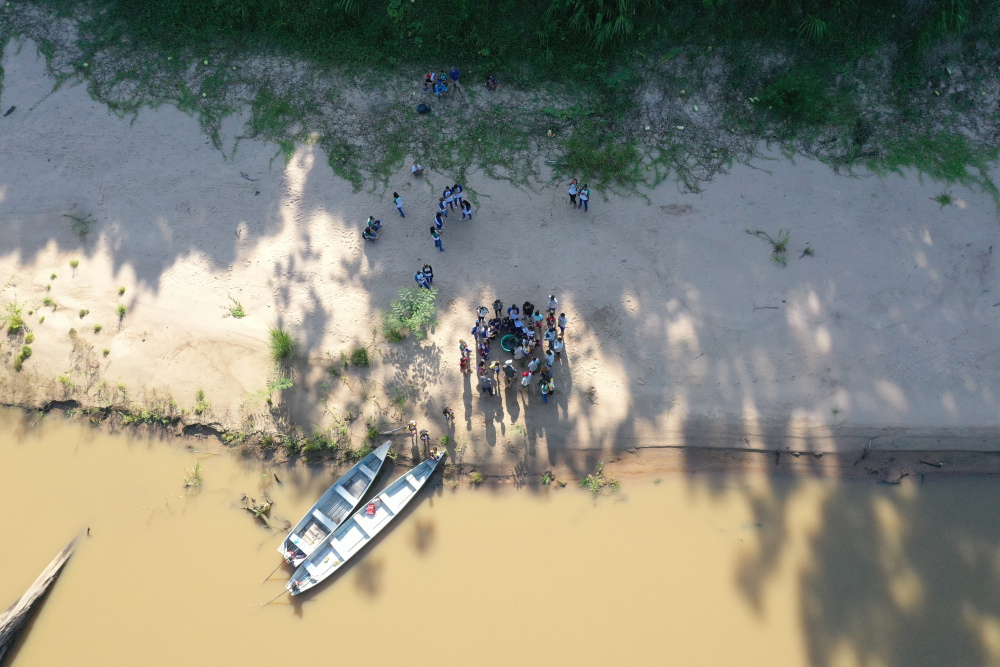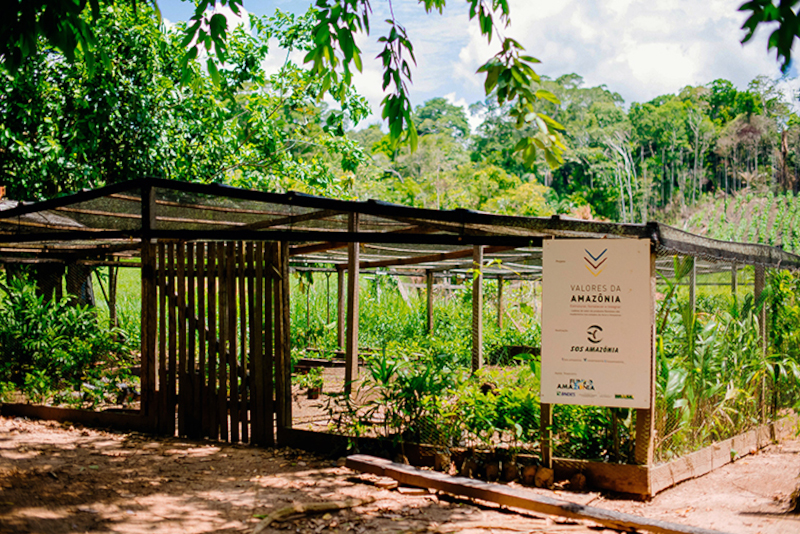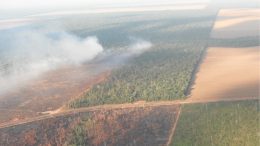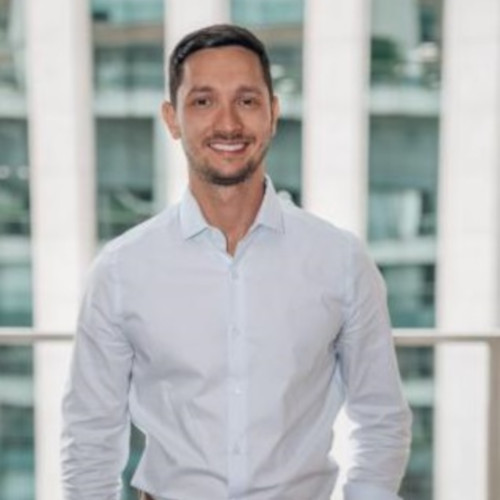(Editor’s note: This article was scheduled for publication even before President Trump and Elon Musk announced their intention to close the United States Agency for International Development, the independent agency of the U.S. State Department that administers civilian foreign aid and assistance — a move that many experts say is illegal. Musk and his team have already hollowed out USAID leadership, accessed critical files and classified documents, and locked employees out of the agency’s headquarters. We expect this story to now echo in hundreds if not thousands of similar situations around the world.)
As a younger man, Osmarino de Souza used to cut down native trees and sell the wood to support his family. Now age 60, he helps a community called Rodrigues Alves, a small Amazon town of just 15,000 in the far north of Brazil, raise money by harvesting local fruits such as cocoa and açaí.
To earn enough income without clearing native forest, Osmarino has the help of the SOS Amazônia Association, one of the hundreds of nongovernmental organizations (ONGs, in Portuguese) that work in the region with resources from Fundo Amazônia, a state fund that supports forest conservation projects, monitors deforestation, and promotes economic projects in Indigenous communities. The fund’s resources are raised through donations from countries such as Norway, Germany, the United Kingdom, Switzerland, and the United States.
Experts say the fund has helped contribute to Brazil’s recent success fighting deforestation, which fell by 30.6% in the Brazilian Legal Amazon region last year.
The U.S. State Department donated an initial $50 million to the fund between last August and October. Last November U.S. President Joe Biden visited Brazil and announced a planned investment of another $50 million, pending congressional approval. Experts at the time said this support could inspire additional large donations from the government and U.S. companies.
Now, however, residents and ONGs such as the one that helps Osmarino are worried that new U.S. President Donald Trump could put the brakes on donations to the fund.
This, in turn, could cause the fight against deforestation and poverty in the Amazon to lose traction.
Their fears are well founded: On Jan. 24 incoming Secretary of State Marco Rubio ordered a 90-day freeze on nearly all foreign assistance worldwide. In recent days Trump and ally Elon Musk have also announced their intent to shutter USAID, the independent State Department agency that administers civilian aid. That leaves many in the Brazilian community wondering what will happen next.
“We know that during Trump’s last term, the climate issue received zero attention and commitment from the U.S.,” says Álisson Maranho, technical director of SOS Amazônia. “So we feel quite insecure about climate policies and these climate agreements at a global level.”
An Innovative Fund
Fundo Amazônia was created in 2008, during the second administration of Brazilian president Luiz Inácio Lula da Silva, to “raise donations for nonreimbursable investments in efforts to prevent, monitor and combat deforestation, and to promote the conservation and sustainable use of the Legal Amazon.” In addition, the fund seeks to support the “development of systems to monitor and control deforestation in the rest of Brazil and in other tropical countries,” according to the agency.

The fund has received donations from countries around the world as well as corporations such as the oil company Petrobras. It is managed by the state-owned National Bank for Economic and Social Development (BNDES, in Portuguese), which seeks to finance various segments of the Brazilian economy in the long term.
“The fund is a very good instrument for the development of socioenvironmental projects, such as the recovery of a deforested area, the promotion of some profits activity within the forest,” says Pedro Cortês, a professor at the University of São Paulo, Brazil’s largest university. “The funds are nonrepayable. It’s not a loan. They’re earmarked for development and, at the end of the day, that’s very important.”
To date the fund has already helped more than 600 ONGs and government projects and has allocated around R$1.7 billion (US$283 million).
Supported projects include Amazônia na Escola (Amazon in School), which promotes sustainable agriculture and healthy school meals in the Legal Amazon, and Restaura Amazônia (Restore the Amazon), which aims to recover 46,000 square miles of native vegetation by 2030. The organization prioritizes projects in Indigenous and quilombolas (Afro-Brazilian peoples) territories.
The fund’s current focus is on generating income for local peoples, which, according to experts, helps to combat deforestation and climate change by reducing their incentive to chop down native trees.
Osmarino, the fruit harvester in Rodrigues Alves, is president of the Nova Cintra Cooperative, which has been receiving resources from Fundo Amazônia via ONGs since 2015. The cooperative, which serves around 400 families, has received equipment such as boats and motors as well as classes in management and good practices. Osmarino says he got funding last year to set up a nursery, where seedlings of açaí, cocoa, and other native trees are planted and distributed to locals so that they can harvest and sell the fruit.

“It’s a good alternative source of income,” he says. Participants sign a contract promising not to commit any further deforestation. And the project itself helps to reforest the land: Nova Cintra distributes native trees to the community and guarantees the purchase of the fruit, so people in the community can not only recover a deforested area but also have a profitable livelihood.
Rodrigues Alves is in the state of Acre, one of the Fundo Amazônia’s focuses. Amazônia na Escola, also located in Acre, runs the SOS Amazônia Association and expects to soon receive its second round of funding. According to Álisson Maranho, technical director of SOS Amazônia, the ONG will use the funds for a new family farming project expected to reach up to 5,000 people.
“The project invests both in training and improving structures for the communities, as well as offering regionalized products for snacks, with natural local foods, instead of ultra-industrialized products,” he says. “We also aim to improve logistics in these regions and focus on generating income.”
Thanks to the extent of ONGs in remote parts of Brazil, the Fundo Amazônia has become a financing tool for generating income and improving the quality of life of local people, who end up choosing to preserve the forest, according to experts.
“The fund is essential for conserving biodiversity, preventing deforestation, promoting sustainable forestry and recovering degraded areas,” says Leandro Juen, a professor at the Federal University of Pará, in the Amazon region. “But it also strengthens environmental policies and the system for monitoring and controlling deforestation.”
Risks Under Trump
The importance of the fund was recognized by former U.S. President Joe Biden: “I will leave my successor and my country a strong foundation to build on if they choose to do so,” he said when announcing the promised investment. He also took a moment to praise ongoing environmental efforts, especially renewable energy, and encourage their progress: “Which government will stand in the way and which will seize the enormous economic opportunity?”
With the election of Donald Trump, however, experts tell me they believe that the new government will not be able to implement the donation, which still needs to pass through the U.S. Congress.
Trump has already announced several executive orders that set aside the entire agenda of combating climate change, which seemed to put this funding at risk even before the announced freeze on State Department funding.
The State Department did not respond to requests about the status of the promised funding in the days after the hold on foreign assistance was announced.
Meanwhile, people I spoke with in Brazil were concerned the change in administration means other corporations or governments will no longer be inspired to also donate to Fundo Amazônia.
“The funds announced are very small,” admits Márcio Holland, professor of economics at FGV. “More important than the amount is the gesture. It’s the U.S. initiative to start as one of the fund’s donor countries. It’s a gesture that other countries could follow.”
But Holland doesn’t seem to expect that gesture to be made under Trump, who made clear during the election that he will not take the environmental debate seriously.
“Clearly,” he says, “his agenda is anti-climatic and, in the same way, it is contrary to this whole discussion of the Amazon, of Brazil being important in the balance of the world environment. This discussion doesn’t cross his mind.”
Mauricio Santoro, a political scientist and professor of international relations and collaborator at the Brazilian Navy’s Center for Political and Strategic Studies, agrees with this view and believes that the Trump administration could still be hostile to the current Lula administration’s conservation agenda.
“With Trump back in office, his government will probably resume an agenda that is very hostile to Brazil in environmental terms, denying that climate change is underway and creating obstacles to more environmental financial aid for developing countries,” he says.
In addition, for Santoro, there is also the possibility that Trump’s allies in the region, such as former Brazilian president Jair Bolsonaro, who paralyzed the activities of the Fundo Amazônia for four years, will be strengthened by the conflict between the Lula administration and the new U.S. government.
“It will probably be a relationship marked by conflicts and disagreements, on issues such as big tech, China, BRICS, the environment, protectionism, and Venezuela,” he says. “There is a very strong identification of the Brazilian Bolsonaro opposition with Trump, and if the American president wants to promote it, this could become a factor of tension in Brazil’s domestic politics.”

Previously in The Revelator:
Donald Trump’s Second Term Will Be Bad News for Endangered Ocean and Coastal Animals


